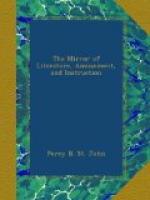* * * * *
PITY.—A FRAGMENT.
(For the Mirror.)
What is pity?
’Tis virtue’s essence,—’tis
benevolence
Itself;—’tis mercy, justice,
charity;
It is the rarest boon that man doth give
to man;
It is the first perfection of our nature;
It is the brightest attribute of heav’n:
Without it man should rank beneath the
brute;
And with it—he is little lower
than angel.
The generous mite of penury is pity;
Nay, ev’n a look.—
Not so the heartless pittance of the affluent,
That is hypocrisy. If you pity,
Your heart is liberal to forgive,
Your memory to forget—
Your purse is open, and your hands are
free
To help the penniless.
CYMBELINE.
* * * * *
THE PENDRILS.
(To the Editor of the Mirror.)
Sir,—From a note which I have just seen at the foot of the interesting account of the escape of Charles the Second, in vol. v. of the mirror, the reader is led to conclude, that the pension granted to Richard Pendril, expired at his death. No such thing. Old Dr. Pendril lived, practised, and died at Alfriston, a little town in the east of Sussex, some forty or fifty years since. His son, John Pendril, died at Eastbourn, four or five years ago. His son, Mr. John Pendril, kept a public house at Lewes, a few years since, to which he added the appropriate sign of the “Royal Oak.” All these in succession enjoyed the pension of —— marks, granted by Charles the Second, together with something of a sporting character called “free warren.” The last Mr. John Pendril was lately living at or near Brighton.
W.W.
* * * * *
EATING “MUTTON COLD.”
(For the Mirror.)
Be good enough to insert the solution of Hen. B.’s difficulty in your last MIRROR, which I send at foot, and thereby oblige a constant




